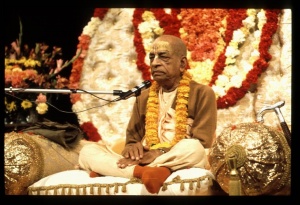CC Madhya 18.194 (1975): Difference between revisions
(Vanibot #0027: CCMirror - Mirror CC's 1996 edition to form a basis for 1975) |
(Vanibot #0020: VersionCompareLinker - added a link to the Version Compare feature) |
||
| Line 2: | Line 2: | ||
<div style="float:left">'''[[Sri Caitanya-caritamrta (1975)|Śrī Caitanya-caritāmṛta (1975)]] - [[CC Madhya (1975)|Madhya-līlā]] - [[CC Madhya 18 (1975)|Chapter 18: Lord Śrī Caitanya Mahāprabhu's Visit to Śrī Vṛndāvana]]'''</div> | <div style="float:left">'''[[Sri Caitanya-caritamrta (1975)|Śrī Caitanya-caritāmṛta (1975)]] - [[CC Madhya (1975)|Madhya-līlā]] - [[CC Madhya 18 (1975)|Chapter 18: Lord Śrī Caitanya Mahāprabhu's Visit to Śrī Vṛndāvana]]'''</div> | ||
<div style="float:right">[[File:Go-previous.png|link=CC Madhya 18.193 (1975)|Madhya-līlā 18.193]] '''[[CC Madhya 18.193 (1975)|Madhya-līlā 18.193]] - [[CC Madhya 18.195 (1975)|Madhya-līlā 18.195]]''' [[File:Go-next.png|link=CC Madhya 18.195 (1975)|Madhya-līlā 18.195]]</div> | <div style="float:right">[[File:Go-previous.png|link=CC Madhya 18.193 (1975)|Madhya-līlā 18.193]] '''[[CC Madhya 18.193 (1975)|Madhya-līlā 18.193]] - [[CC Madhya 18.195 (1975)|Madhya-līlā 18.195]]''' [[File:Go-next.png|link=CC Madhya 18.195 (1975)|Madhya-līlā 18.195]]</div> | ||
{{CompareVersions|CC|Madhya 18.194|CC 1975|CC 1996}} | |||
{{RandomImage}} | {{RandomImage}} | ||
==== TEXT 194 ==== | ==== TEXT 194 ==== | ||
<div class="verse"> | <div class="verse"> | ||
:tāṅra sevā vinā jīvera nā yāya | :tāṅra sevā vinā jīvera nā yāya 'saṁsāra' | ||
:tāṅhāra caraṇe | :tāṅhāra caraṇe prīti--'puruṣārtha-sāra' | ||
</div> | </div> | ||
| Line 25: | Line 24: | ||
<div class="translation"> | <div class="translation"> | ||
"No conditioned soul can get out of material bondage without serving the Supreme Personality of Godhead. Love at His lotus feet is the ultimate goal of life. | |||
</div> | </div> | ||
| Line 32: | Line 31: | ||
<div class="purport"> | <div class="purport"> | ||
According to the | According to the Mohammedan scripture, without evādat, offering prayers at a mosque or elsewhere five times daily (namāja), one cannot be successful in life. Śrī Caitanya Mahāprabhu pointed out that in the revealed scripture of the Mohammedans, love of Godhead is the ultimate goal. Karma-yoga and jñāna-yoga are certainly described in the Koran, but ultimately the Koran states that the ultimate goal is the offering of prayers to the Supreme Person (evādat). | ||
</div> | </div> | ||
Latest revision as of 11:16, 27 January 2020

A.C. Bhaktivedanta Swami Prabhupada
TEXT 194
- tāṅra sevā vinā jīvera nā yāya 'saṁsāra'
- tāṅhāra caraṇe prīti--'puruṣārtha-sāra'
SYNONYMS
tāṅra—His; sevā—service; vinā—without; jīvera—of the conditioned soul; nā—not; yāya—finishes; saṁsāra—material bondage; tāṅhāra—His; caraṇe—at the lotus feet; prīti—love; puruṣārtha-sāra—the ultimate goal of life.
TRANSLATION
"No conditioned soul can get out of material bondage without serving the Supreme Personality of Godhead. Love at His lotus feet is the ultimate goal of life.
PURPORT
According to the Mohammedan scripture, without evādat, offering prayers at a mosque or elsewhere five times daily (namāja), one cannot be successful in life. Śrī Caitanya Mahāprabhu pointed out that in the revealed scripture of the Mohammedans, love of Godhead is the ultimate goal. Karma-yoga and jñāna-yoga are certainly described in the Koran, but ultimately the Koran states that the ultimate goal is the offering of prayers to the Supreme Person (evādat).